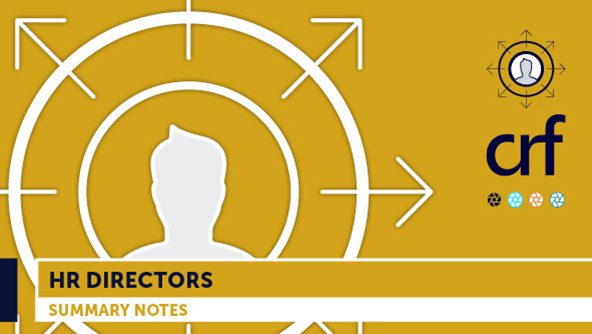D&I and Wellbeing
HRD Community Summary Notes: DE&I Reframing
CRF hosted an HR Director roundtable discussion on the topic of how organisations are reframing their approaches to Diversity, Equity and Inclusion (DE&I). The debate around DE&I has intensified in recent months, with several high-profile organisations rethinking their approach. Compounding the complexity, the recent UK Supreme Court ruling on gender and biological sex has raised further questions about how organisations design and implement inclusive policies.
During the session, Inclusive Employers – an organisation working with around 500 organisations across the UK and internationally to audit, train and embed workplace inclusion – shared insights on how DE&I is evolving globally and practical recommendations regarding how employers should approach these shifts. This summary shares key insights from the session, including lessons learned shared by attendees.
Navigating the Changing DEI Landscape: Context, Concerns and Moving Forward
Rosie Clarke, Principal Consultant at Inclusive Employers, shared insights from the organisation’s work on how DEI is evolving globally.
The global context, particularly US President Donald Trump’s recent claims about ending the ‘tyranny’ of DE&I policies has left many organisations wondering about the future of DE&I. However, the reality that Inclusive Employers has seen on the ground is more nuanced than headlines may suggest. While there have been visible changes at high-profile companies – especially those with US government contracts – the underlying commitment to DE&I remains strong in many organisations.
The environment is also different within the UK. The current government has introduced some progressive moves – like stronger sexual harassment protections and proposals for ethnicity and disability pay gap reporting – but there’s also complexity, as evidenced by the recent Supreme Court ruling on biological sex.
Inclusive Employers have observed four key shifts in how organisations are approaching DE&I:
- Language Shifts. Many organisations are moving away from using “DE&I” as a term to instead emphasising principles such as “dignity and respect” or “fair and consistent practices.” These principles are DE&I, just presented through a different lens.
- Role Shifts. Some Chief Diversity Officer roles have been reframed or renamed (e.g. to VP of Culture and Inclusion), but the responsibilities and work often continue under different titles or within broader HR/talent functions. Whilst a handful of organisations have disbanded their DE&I teams and made those roles redundant, a more common approach is to move those individuals into broader talent development or culture teams.
- Review of Targeted Programmes. Initiatives for specific groups (e.g. women-only) have come under scrutiny. Whilst some have paused, others have been widened to include all employees while still monitoring demographic data.
- Shift Away from Explicit Targets. Some companies are moving away from explicit hiring and promotion targets, instead focusing on building fair and consistent processes that aim to reduce bias more broadly.
Strategies for Navigating Challenges in the DE&I Space
- Focus on outcomes, not labels. Rebranding is the number one shift that Inclusive Employers has observed. Even organisations that have claimed to scale back DE&I efforts are often continuing the work – such as minimising bias – under different terms.
- Reframe in terms of business value. Consider how a true meritocracy supports your organisation. Without DE&I work, many businesses reinforce the same norms and behaviours.
- Review programme design. Ensure initiatives are focused on removing barriers and creating equal opportunities, rather than being perceived as offering preferential treatment to specific groups. This is a good opportunity to take stock and consider whether initiatives are still fit for purpose and are driving the required outcomes.
- Build an evidence base. All DE&I work should be grounded in impact measures from the outset. Collect data on how DE&I improves decision-making and supports talent retention to help you make the commercial case for DEI within your organisation.Currently, too many initiatives are treated as short-term projects rather than strategic, long-term work integrated into core HR functions.
- Align with core values. Many organisations have embedded inclusion into their value proposition and culture. As long as legal obligations are being met, there’s no reason to stop doing this.
Update on UK Supreme Court Ruling on Biological Sex
- The picture is complex and is often discussed without nuance. Generally, outside of HR specialists, people are not particularly well-informed on the subject as they have not had the opportunity to be. There is therefore an education gap that needs to be addressed before making any major changes.
- At its core, this is a human rights issue – everyone should be able to access bathroom facilities safely. We need to ask: what is the safest and most inclusive solution, and what does our workforce need and expect from us?
- There are also credible legal risks to consider. For example, if an organisation introduces a policy stating that “only biological women can use this facility,” and then reverses it six months later due to updated guidance, that lack of consistency could carry significant risk.
- The Equality and Human Rights Commission (EHRC) has released interim guidance on this issue. However, it does not offer definitive answers or legal clarity for supporting all employees – it is a suggestion on what organisations should do. The EHRCs full guidance, which may be statutory, is due to be released this summer.
- Another critical question is: how do you prove someone’s biological sex? It is completely unacceptable to ask anyone to prove their biology in the workplace, which raises questions about how policies in this area can be effectively managed. Until this guidance is clearer, it’s very difficult to make any firm or physical changes to facilities like toilets or changing rooms.
- Rosie advised organisations to pause and hold steady; to continue focusing on dignity, respect and wellbeing but not to rush into major policy changes. The broader picture is still evolving, and further legal challenges are already in progress, including one launched in the European courts.
Q: Does reviewing programme designs signal a move away from positive action? And if so, how can organisations continue to accelerate change?
A: Legally, positive action remains valid and exists for good reason, as inequality still persists. However, there is a noticeable pause in some organisations. The distinction between positive action and positive discrimination – which is illegal – remains a grey area for many employers. There is a growing atmosphere of caution, particularly in organisations with US operations. However, organisations should be aware that managing the risk is not the same as retreating entirely from positive action.
Member Insights
Members additionally shared the following experiences and lessons learned:
- Several members shared how they have received increasing questions from employees in response to global developments, such as the UK Supreme Court ruling. They emphasised the importance of proactive communication and ensuring employees feel treated with dignity and respect.
- Members highlighted the importance of working with data and evidence, being intentional about where to focus resources and activity, and doing what they can to measure impact.
- One member shared that they have a small DE&I team, as their approach is to embed DE&I throughout HR and the wider organisation. Another member described how they are moving from group-specific initiatives to broader, organisation-wide programmes, while still monitoring demographic participation to enable targeted action where needed.
- According to one participant, shareholder interest in DE&I impact measures is growing, with increasing focus on understanding: “What are we doing, and what is the effect?”
Further Resources
CRF. 2024. Evidence-Based HR: A New Paradigm
CRF. 2024. Sustaining Employee Wellbeing
CRF. 2025. Labour’s Employment Reforms on People Strategies
UPCOMING CRF EVENT:
Creating an Inclusive Culture
10 June 2025: 09:00 – 15:30 BST (In-Person)
17 June 2025: 14:00 – 15:00 BST (Online)
MEMBER LOGIN TO ACCESS ALL CRF CONTENT



